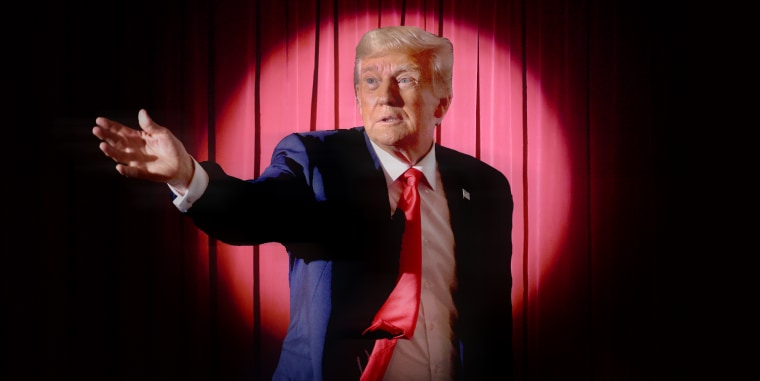The first New York Times/Sienna College poll of the 2024 campaign season, released Monday, showed former President Donald Trump absolutely dominating the 2024 presidential field. The poll showed Trump with 53 percent support among likely Republican voters, Florida Gov. Ron DeSantis with 17 percent, and every other candidate at 3 percent or lower. And the survey found that in a hypothetical one-on-one matchup without the other candidates, Trump leads DeSantis 62 percent to 31 percent.
What’s most striking about the gap between Trump and DeSantis is its consistency among almost every demographic group and ideological sector of the party. Even on abortion, which is both a high-profile policy space and the rare topic that reliably inspires single issue voters in the GOP, Trump leads DeSantis among Republicans who have opposite views on the issue, including the Republicans who strongly support the kind of six-week abortion ban that DeSantis signed into law this year. And one of DeSantis’ key strategies to distinguish himself from Trump — waging a war on “wokeness” with such ferocity that it would make Trump look like a complacent moderate by comparison — has not borne fruit: Trump leads him among Republicans motivated by fighting “radical woke ideology.”
Trump clobbers DeSantis in terms of being seen as “fun.”
One explanation for DeSantis’ difficulties can be found in a somewhat unusual metric: how “fun” voters think a candidate is. As the Times reports, DeSantis actually leads Trump narrowly on being seen as “likable” and “moral.” But Trump clobbers DeSantis in terms of being seen as “fun.” As the Times notes, “the share of Republicans who said Mr. Trump was more “fun” than Mr. DeSantis (54 percent to 16 percent) almost perfectly mirrored the overall horse race.”
That Republican voters view Trump as much more fun than DeSantis doesn’t prove that that quality is one of their chief criteria for preferring him. But it’s a useful proxy for gauging voter perception of Trump’s charisma as a candidate, which becomes a more important factor when it seems ideology doesn't explain his popularity. As I’ve written in the past, Trump’s political success is inextricably intertwined with his public identity as a comic, jester and troll. Trump’s predecessor, Barack Obama, used soaring rhetoric about unity to inspire a sense of hope in his supporters. Trump makes his supporters laugh.
One of the voters interviewed in the Times piece even seems to tie Trump’s ability to entertain more effectively than DeSantis with perception of his energy as an executive:
“He does not come across with humor,” Sandra Reher, 75, a retired teacher in Farmingdale, N.J., said of Mr. DeSantis. “He comes across as a — a good Christian man, wonderful family man. But he doesn’t have that fire, if you will, that Trump has.”
One of the weird things about living in a democracy, especially in a presidential system, is that the personality of a politician — rather than their policy views — can become a major factor in how voters assess whether they will vote vote for them. George W. Bush’s 2000 victory over John Kerry is often attributed in part to polling indicating voters would rather share a beer with him than Kerry (never mind that Bush, a former alcoholic, is a teetotaler).
The most empathetic way to look at these kinds of poll results is to point out that politicians aren’t just policy machines, but human beings, and it’s impossible for many voters to ignore the way a politician behaves on a personal level when trying to decide whether to trust him or her, particularly since most voters don’t have fixed ideological commitments. Given how much of human communication is nonverbal, some of this seems unavoidable.
That charitable explanation doesn’t make the phenomenon less depressing. Our political culture should encourage citizens to view democratic elections as contests of principles, not personalities. And to the extent that one's demeanor is a reflection of one's values, I wouldn't rate being fun as an important one for a politician. The specific way that Trump enthralls his base says a lot about his movement: His ability to make them feel good by mocking the vulnerable, breaking taboos tied to social inclusiveness and democratic norms, and never seeming to take anything except his the pursuit of personal power seriously, is not something that should be normalized or accepted. It marks a degradation of democratic life.
Of course we cannot isolate just the “fun” factor as the reason for Trump’s dominance. As a former president, Trump is a well-known quantity and has had more time to build trust with the Republican base than other candidates. But at the same time, he’s had a lot of time to lose their trust too, given that he failed to fulfill many campaign promises, lost the 2020 election, helped curse his party in the midterms with a historic underperformance, and has so many legal troubles that he could plausibly be running for president as a strategy for avoiding prison time.
Many other politicians with Trump’s trajectory would be seen as a joke candidate this time around, particularly since he's no longer ideologically unique in the GOP — right-wing nationalism is now the party norm. It only makes sense to deduce that a significant amount of his current popularity is tied to his persona. DeSantis might be more competent and more fervently MAGA than Trump at this point, but only Trump can promise that the Trump show will go on.

